Although set in 1939, The Lab’s ‘Ballyhoo’ offers insights into immigrants’ efforts to fit in
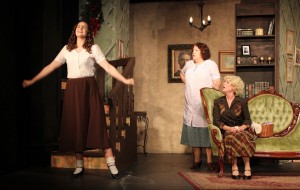 Alfred Uhrey’s The Last Night of Ballyhoo opened at Lab Theater on April 14. On its surface, it’s a Tony-winning play about an extended Jewish family’s relationship with their religion and each other. But dig deeper, and you’ll discover a wonderfully insightful story about the attempts of the younger generation to assimilate into the fabric of American
Alfred Uhrey’s The Last Night of Ballyhoo opened at Lab Theater on April 14. On its surface, it’s a Tony-winning play about an extended Jewish family’s relationship with their religion and each other. But dig deeper, and you’ll discover a wonderfully insightful story about the attempts of the younger generation to assimilate into the fabric of American 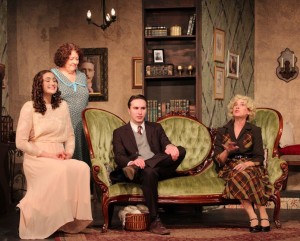 society that resonates today not only with African-American, Hispanic and Asian segments of our population, but members of the LGBTQ community. Thanks to sharp direction and superb acting, The Lab’s production of Ballyhoo operates successfully on both of these levels.
society that resonates today not only with African-American, Hispanic and Asian segments of our population, but members of the LGBTQ community. Thanks to sharp direction and superb acting, The Lab’s production of Ballyhoo operates successfully on both of these levels.
The audience gets its first clue about Uhrey’s overarching theme as soon as it enters the theater and lays eyes on the Victorian-appointed living room of the Levy-Freitags’ 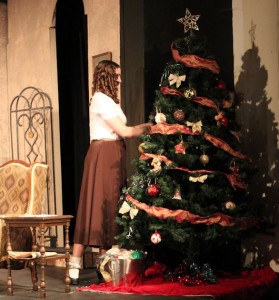 Spanish Mission Style home. Tucked into the corner next to the front window is not a menorah, but a gaily-decorated Christmas tree. And it is here that the play opens with 22-year-old Lala Levy singing “The First Noel” as she puts the finishing touches on the tree. But she goes too far with the star she’s bought for the topper, which draws the ire of her severe sharp-tongued mother Boo (short for Beulah). It symbolizes the birth of Jesus, she points out humorlessly, and has no place on a Jewish Christmas tree.
Spanish Mission Style home. Tucked into the corner next to the front window is not a menorah, but a gaily-decorated Christmas tree. And it is here that the play opens with 22-year-old Lala Levy singing “The First Noel” as she puts the finishing touches on the tree. But she goes too far with the star she’s bought for the topper, which draws the ire of her severe sharp-tongued mother Boo (short for Beulah). It symbolizes the birth of Jesus, she points out humorlessly, and has no place on a Jewish Christmas tree.
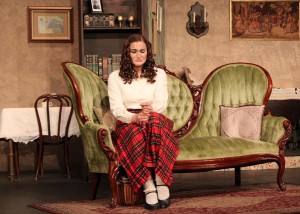 But it’s emblematic of Lala’s obsession with fitting into 1939 Atlanta high society. She yearns to be seen at the opening of Gone with the Wind, but has no one to take her. She dreams of writing her own version of the Margaret Mitchell classic and flying off to Hollywood for the filming of the movie. She buys a dress for the seasonal cotillion-type ball called Ballyhoo that could have been culled from
But it’s emblematic of Lala’s obsession with fitting into 1939 Atlanta high society. She yearns to be seen at the opening of Gone with the Wind, but has no one to take her. She dreams of writing her own version of the Margaret Mitchell classic and flying off to Hollywood for the filming of the movie. She buys a dress for the seasonal cotillion-type ball called Ballyhoo that could have been culled from 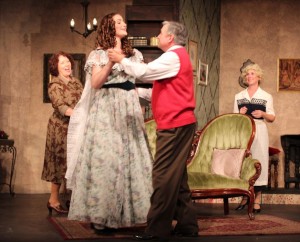 Scarlett O’Hara’s boudoir. But it’s not because she’s a fan of Clark Gable and Vivien Leigh. Scarlett O’Hara is the penultimate Southern Belle and Lala is desperate to fit in. But she doesn’t fit in, as she learned to her chagrin when the sorority she favored rejected her as a pledge, precipitating her flight from the University of Michigan and subsequent four-year cloister in her uncle’s home.
Scarlett O’Hara’s boudoir. But it’s not because she’s a fan of Clark Gable and Vivien Leigh. Scarlett O’Hara is the penultimate Southern Belle and Lala is desperate to fit in. But she doesn’t fit in, as she learned to her chagrin when the sorority she favored rejected her as a pledge, precipitating her flight from the University of Michigan and subsequent four-year cloister in her uncle’s home.
Lala’s cousin, Sunny Freitag, is everything Lala not. 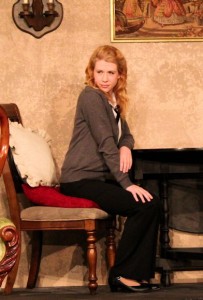 Where Lala is loud, Sunny is sweetly soft-spoken. Where Lala is coifed with dark curls, Sunny sports straight blond tresses. Where Lala is a college drop-out, Sunny is an A minus student at Wellesley (she had a little trouble with Zoology, or she’d be straight A’s). But most of all, Sunny possesses the Aryan features Lala covets. She looks like everyone else and that, Lala assumes, is the secret to her cousin’s success.
Where Lala is loud, Sunny is sweetly soft-spoken. Where Lala is coifed with dark curls, Sunny sports straight blond tresses. Where Lala is a college drop-out, Sunny is an A minus student at Wellesley (she had a little trouble with Zoology, or she’d be straight A’s). But most of all, Sunny possesses the Aryan features Lala covets. She looks like everyone else and that, Lala assumes, is the secret to her cousin’s success.
It is Lala’s inability and Sunny’s ability to fit in that fuels the rivalry between these two cousins and creates the family dynamic at the heart of The Last Night of Ballyhoo. If you grew up with siblings or even overachieving cousins, you will relate to the antics of Lala, Sunny and their 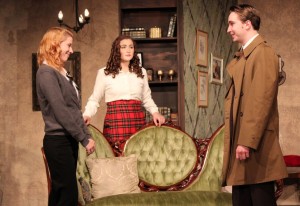 moms as the girls posture for dates to Ballyhoo and compete for the affection of their uncle, Adolph, who serves as the father figure in a home dominated by females. And that makes for some very funny moments indeed.
moms as the girls posture for dates to Ballyhoo and compete for the affection of their uncle, Adolph, who serves as the father figure in a home dominated by females. And that makes for some very funny moments indeed.
It is perhaps unfair to single out individual performances in this two-act production because the cast works 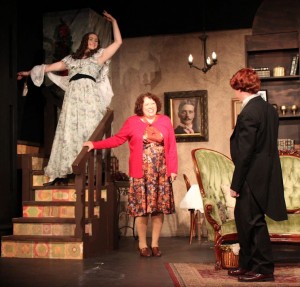 symbiotically to endearingly portray a family that functions as a cohesive unit in spite of their individual quirks and idiosyncrasies. John Repa is superb as Uncle Adolph, who anchors the family and delivers some of the play’s funniest lines. Bonnie Knapp is razor-sharp as Lala’s mom, Boo, who demonstrates with every facial expression, inflection and movement her bitterness over being shut out of the family business, frustration with her daughter’s dysfunctionality, and disapproval of everyone and everything else. S
symbiotically to endearingly portray a family that functions as a cohesive unit in spite of their individual quirks and idiosyncrasies. John Repa is superb as Uncle Adolph, who anchors the family and delivers some of the play’s funniest lines. Bonnie Knapp is razor-sharp as Lala’s mom, Boo, who demonstrates with every facial expression, inflection and movement her bitterness over being shut out of the family business, frustration with her daughter’s dysfunctionality, and disapproval of everyone and everything else. S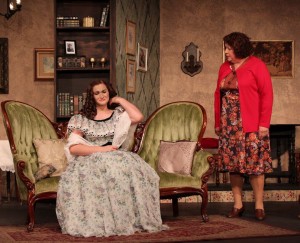 teven Coe is marvelous as Uncle Adolph’s new salesman, Joe Farkas, a Brooklyn Jew of Eastern European descent who cannot fathom and won’t tolerate prejudice within his own ethnic group. He’s good early on, but saves his best acting for the play’s final scenes. And newcomer Tyler Charpentier could not be more comical as he courageously portrays the Lala’s oddball Ballyhoo date, social climber Peachy (“What do you think?)
teven Coe is marvelous as Uncle Adolph’s new salesman, Joe Farkas, a Brooklyn Jew of Eastern European descent who cannot fathom and won’t tolerate prejudice within his own ethnic group. He’s good early on, but saves his best acting for the play’s final scenes. And newcomer Tyler Charpentier could not be more comical as he courageously portrays the Lala’s oddball Ballyhoo date, social climber Peachy (“What do you think?) 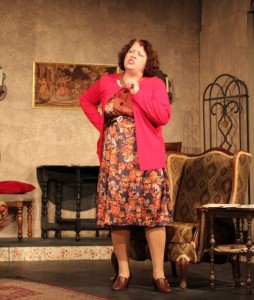 Weil.
Weil.
But Lexie Anne Cole, Kate Dirrigl and Amy Tardiff are unquestionably stand-outs in their roles as Lala, Sunny and Sunny’s mom, Reba. Just a Cypress Lake junior, Cole is mesmerizing as the self-loathing, Kardashian-style drama queen with a proclivity for stomping, stamping and couch-flopping histrionics. Dirrigl’s character is much more nuanced, requiring a more reserved and understated demeanor as catalyst for her cousin’s outbursts and Alfred Uhrey’s stand-in for Jews who’ve denied their heritage and identity to the point they don’t even know Yiddish v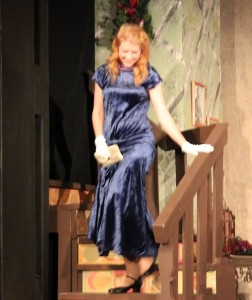 ernacular, never mind Hebrew or the fine points of their religion or cultural disharmony. And Amy Tardiff deserves mega-props as the mad knitting Reba Freitag, who is deliriously oblivious to the stream of non-sequiturs she delivers one after another.
ernacular, never mind Hebrew or the fine points of their religion or cultural disharmony. And Amy Tardiff deserves mega-props as the mad knitting Reba Freitag, who is deliriously oblivious to the stream of non-sequiturs she delivers one after another.
There are numerous reasons to go see this play. The script is well-written. The acting is terrific. The set and costumes are spot on (wait until you see how The Lab segues from the Levy-Freitag living room to railroad sitting car). And there are lessons to be pondered long after the cast takes its well-deserved bows. The Last Night of Ballyhoo is another 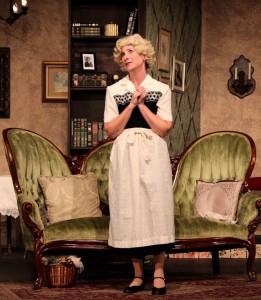 excellent choice by a theater group that’s always on the look-out for productions that can serve as community conversation starters when it comes to the issues of today.
excellent choice by a theater group that’s always on the look-out for productions that can serve as community conversation starters when it comes to the issues of today.
April 14, 2017.
RELATED POSTS.
- ‘Last Night of Ballyhoo’ opens at Lab Theater on April 14
- April 20 ‘Ballyhoo’ talk-back to include Bob Hilliard
- Meet ‘Last Night of Ballyhoo’ actor Bonnie Knapp
- Meet ‘Last Night of Ballyhoo’ actor John Repa
- Meet ‘Last Night of Ballyhoo’ actor Kate Dirrigl
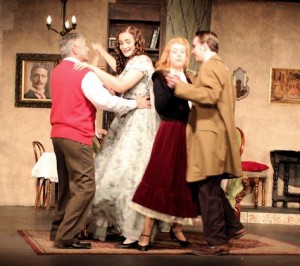 Meet ‘Last Night of Ballyhoo’ actor Amy Tardiff
Meet ‘Last Night of Ballyhoo’ actor Amy Tardiff- Meet ‘Last Night of Ballyhoo’ actor Steven Coe
- Meet ‘Last Night of Ballyhoo’ actor Lexie Anne Cole
- ‘Last Night of Ballyhoo’ play dates, times and ticket info














 Tom Hall is both an amateur artist and aspiring novelist who writes art quest thrillers. He is in the final stages of completing his debut novel titled "Art Detective," a story that fictionalizes the discovery of the fabled billion-dollar Impressionist collection of Parisian art dealer Josse Bernheim-Jeune, thought by many to have perished during World War II when the collection's hiding place, Castle de Rastignac in southern France, was destroyed by the Wehrmacht in reprisal for attacks made by members of the Resistance operating in the area. A former tax attorney, Tom holds a bachelor's degree as well as both a juris doctorate and masters of laws in taxation from the University of Florida. Tom lives in Estero, Florida with his fiancee, Connie, and their four cats.
Tom Hall is both an amateur artist and aspiring novelist who writes art quest thrillers. He is in the final stages of completing his debut novel titled "Art Detective," a story that fictionalizes the discovery of the fabled billion-dollar Impressionist collection of Parisian art dealer Josse Bernheim-Jeune, thought by many to have perished during World War II when the collection's hiding place, Castle de Rastignac in southern France, was destroyed by the Wehrmacht in reprisal for attacks made by members of the Resistance operating in the area. A former tax attorney, Tom holds a bachelor's degree as well as both a juris doctorate and masters of laws in taxation from the University of Florida. Tom lives in Estero, Florida with his fiancee, Connie, and their four cats.